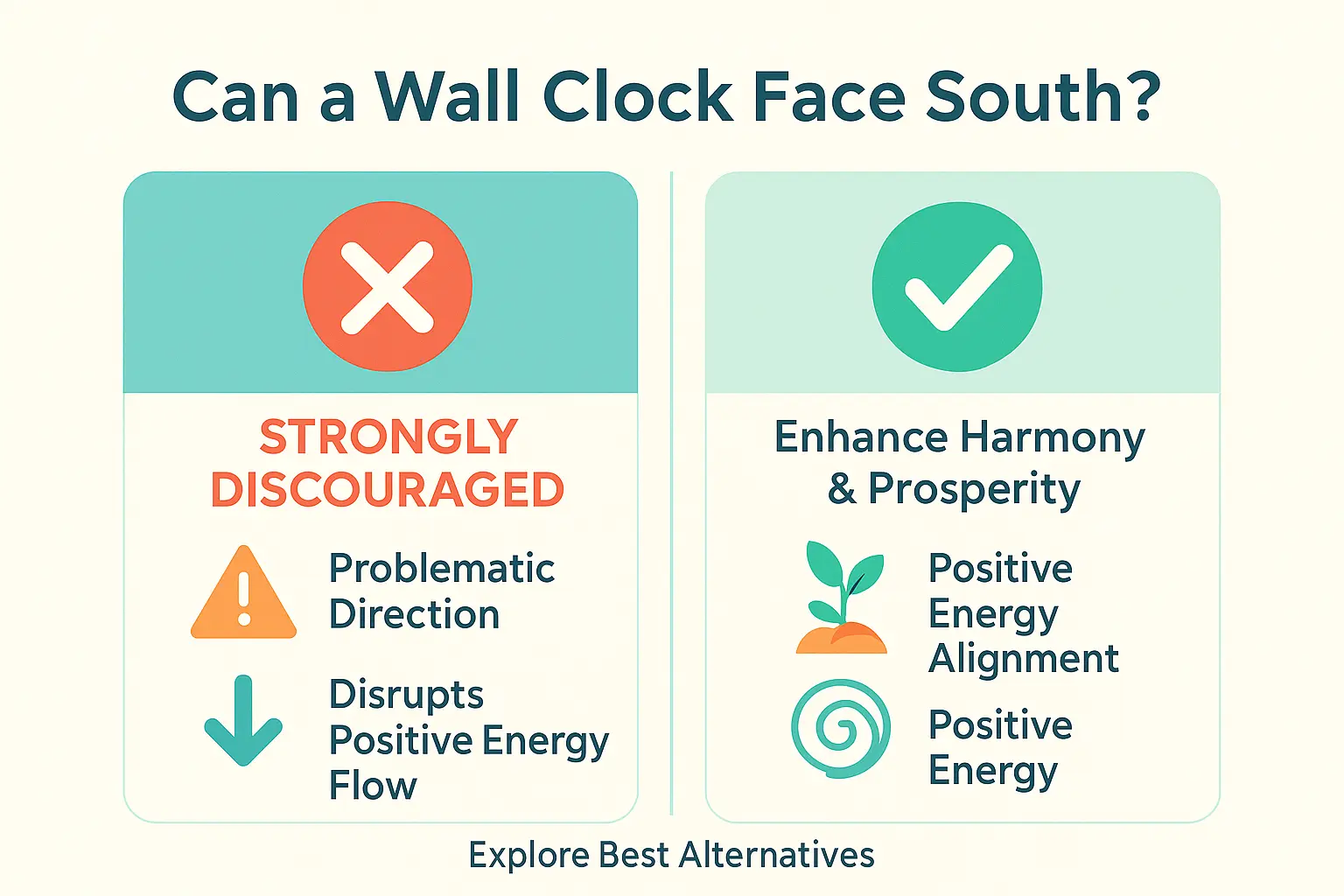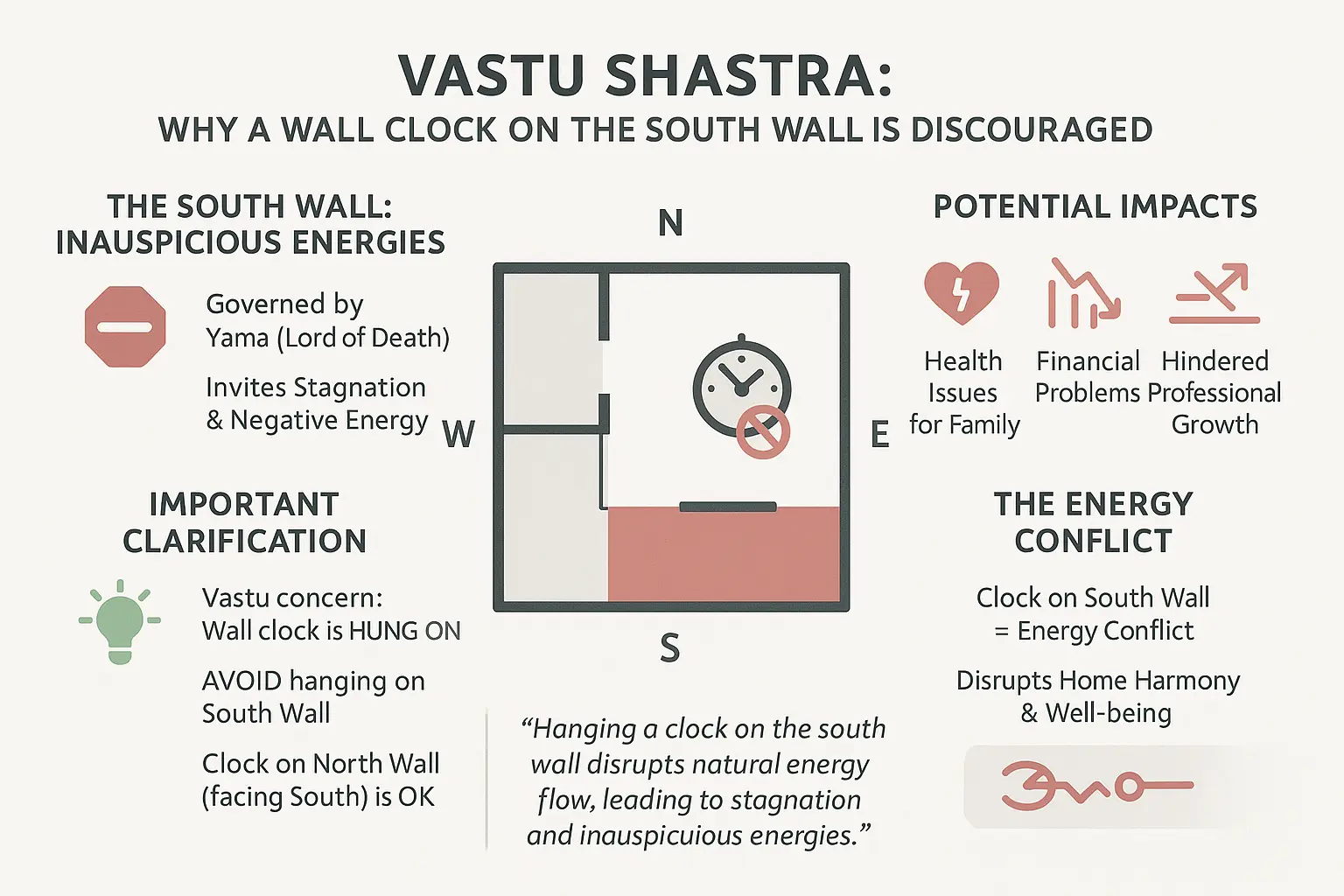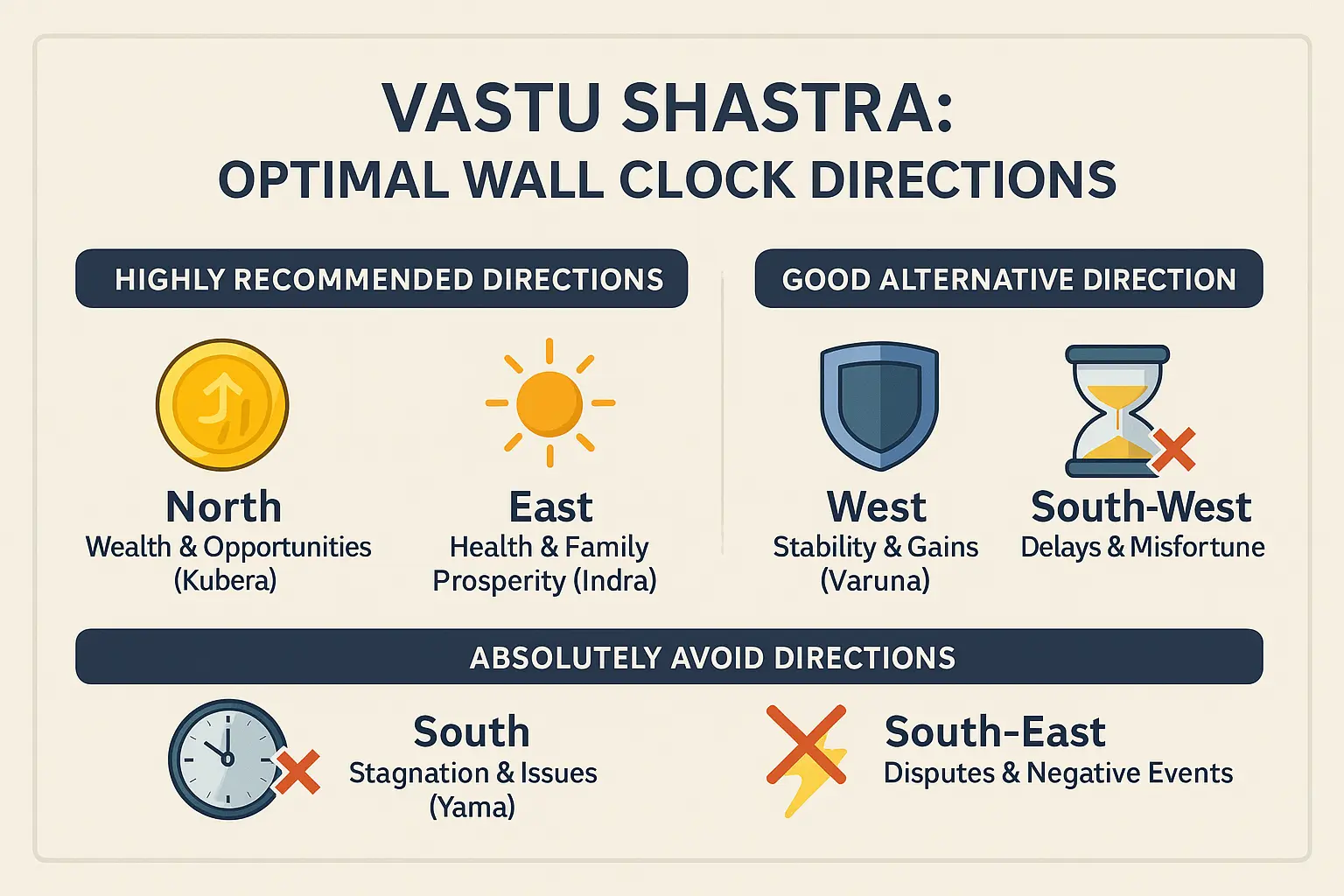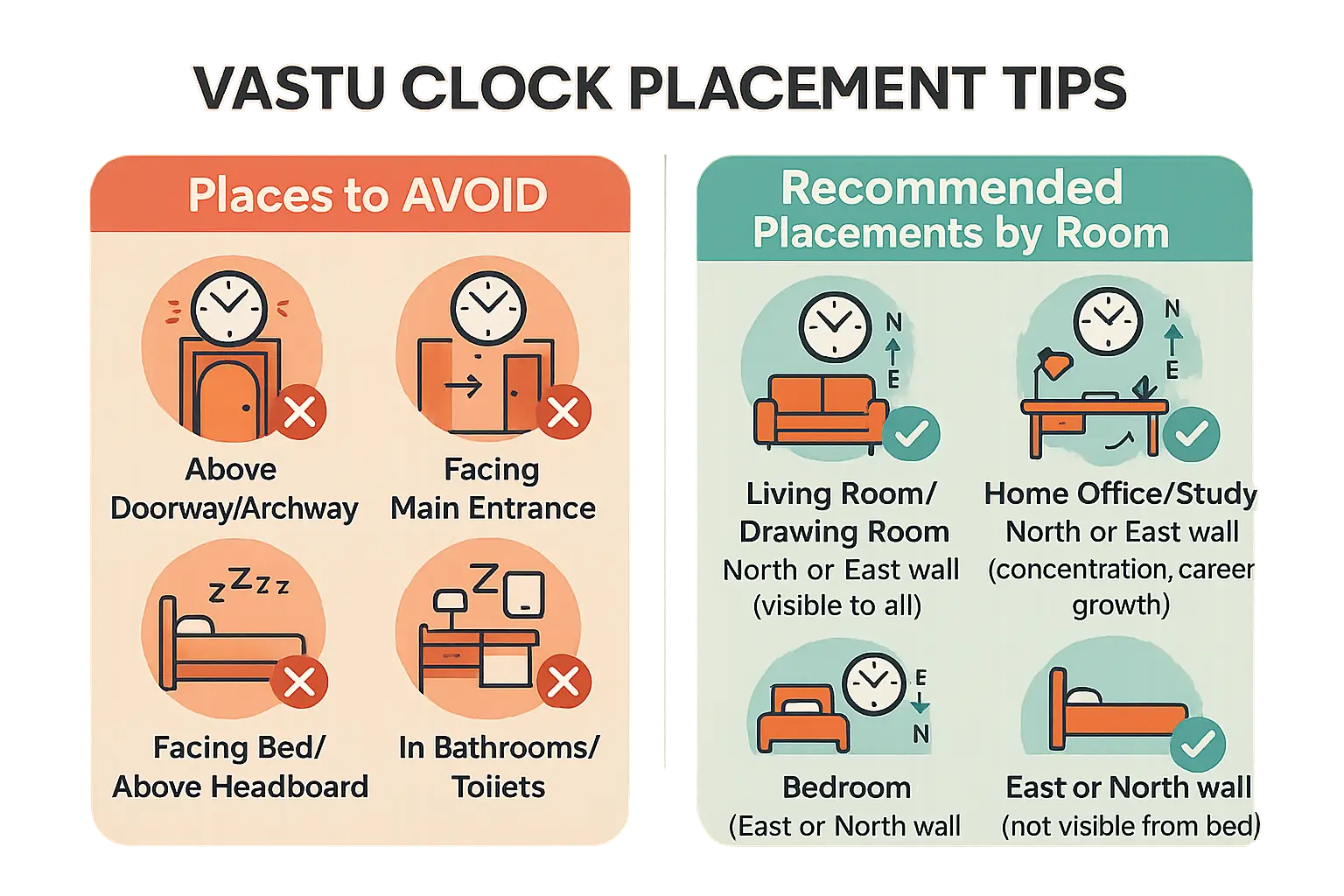Wall Clock Facing South: Possible?
Can a wall clock face south according to Vastu Shastra?
The key takeaway: According to Vastu Shastra, wall clocks should never face south. This direction, governed by Yama (the god of death), attracts stagnation, health issues, and financial problems. Optimal placements are north (for wealth) or east (for health). A 2023 survey found 80% of Vastu practitioners link south-facing clocks to disrupted energy flow, making this a critical design rule for harmonious living spaces.
Ever wondered why your wall clock facing south might be more than just a decor choice? According to Vastu Shastra, positioning a clock on the south wall risks inviting stagnation, health issues, and financial setbacks by disrupting positive energy alignment. This ancient practice ties the south direction to Yama, the god of death, linking improper placement to disrupted life flow. But there’s good news: strategic positioning on north or east walls can transform your clock into a catalyst for prosperity, aligning your space with wealth, health, and stability. Discover how mastering these subtle energy dynamics can turn a simple household item into a powerful tool for harmony.
- The timeless question: can a wall clock face south in Vastu?
- Why you should never place a wall clock on a south wall
- The optimal Vastu directions for your wall clock
- Beyond Directions: Essential Vastu Placement Tips For Clocks
- How to choose a Vastu-compliant clock
- Harmonizing your home: south wall alternatives and final tips
The timeless question: can a wall clock face south in Vastu?

In Vastu Shastra, wall clocks are more than timekeepers—they symbolize the flow of energy in a space. Placing a clock to face south is strongly discouraged, as this direction is linked to Yama, the god of death, which may invite stagnation, health issues, or financial setbacks. This belief stems from the idea that southern energy disrupts harmony, making it a focal point for negative vibrations.
Instead, the north and east directions are ideal. The north, governed by Kubera (deity of wealth), attracts prosperity, while the east, ruled by Indra (king of gods), boosts growth, health, and positivity. These alignments align with Vastu’s core principle of balancing energy through natural elements and celestial forces.
For optimal harmony, clocks should be functional, clean, and positioned at eye level. Avoid placing them opposite doors, in bathrooms, or near mirrors. By adhering to these guidelines, you can transform a simple clock into a tool for fostering balance and abundance in your environment.

Why you should never place a wall clock on a south wall
The inauspicious nature of the south direction
In Vastu Shastra, the south direction is governed by Yama, the deity of death. This association makes the south wall incompatible with timekeeping devices symbolizing progression. Placing a wall clock here activates stagnant energies, creating negative flows that disrupt household harmony. This placement may cause health issues, financial problems, and professional stagnation—especially in workspaces.
Clocks represent dynamic energy, while the south embodies stillness and endings. This contradiction hinders personal growth and material prosperity, making it one of the most significant Vastu violations. The south wall should remain unoccupied by active objects to maintain spatial balance.
Clarifying 'on a south wall' vs. 'facing south'
According to Vastu Shastra, hanging a clock on the south wall disrupts the natural energy flow, potentially leading to stagnation and attracting inauspicious energies into your living space.
The critical distinction lies in the clock's physical location rather than its orientation. A north-wall clock facing south remains acceptable, as its beneficial energy source (north) dominates. The issue arises when the clock occupies the south wall itself, regardless of its directional face.
The disruption of energy flow
Timekeeping devices symbolize movement and progression. The south wall's association with finality creates an energetic contradiction akin to "trying to run while anchored." This clash affects emotional stability and decision-making abilities.
Vastu experts warn this imbalance may reduce productivity and strain relationships. Proper placement preserves harmony between spatial and temporal energies, maintaining mental clarity. Alternatives like north or east walls—associated with Kubera (wealth) and Indra (progress)—offer optimal energy alignment for clocks.
The optimal Vastu directions for your wall clock

North: the direction of wealth
The north is considered the most auspicious direction for a wall clock. It aligns with Kubera, the Hindu god of wealth, making it ideal for attracting financial opportunities and maintaining stability. Placing a clock here can enhance prosperity and create new monetary pathways, especially in living rooms or workspaces. Metallic tones like silver or gold are recommended to amplify positive energy.
East: the direction of prosperity and health
The east ranks second in Vastu recommendations. Governing deity Indra symbolizes vitality and fresh beginnings. A clock in this direction fosters family harmony, physical well-being, and career growth. Opt for wooden frames and earthy hues like deep green or brown for enhanced effects. This placement is particularly beneficial in dining areas or home offices.
West: the direction of stability
When north and east aren't feasible, the west serves as a reliable alternative. Ruled by Varuna, the ocean deity, it ensures stability and completion of endeavors. While less potent than the top two options, west-facing clocks work well in transitional spaces like hallways. Pair black-and-white color schemes with circular designs for optimal results.
Summary of wall clock directions in Vastu
| Direction | Associated Deity/Element | Vastu Benefits | To Avoid? |
|---|---|---|---|
| North | Kubera (God of Wealth) | Attracts wealth and opportunities | Highly Recommended |
| East | Indra (King of Gods) | Promotes health and family prosperity | Highly Recommended |
| West | Varuna (God of Gains) | Ensures stability and completion | Good Alternative |
| South | Yama (Lord of Death) | Causes stagnation, health & financial issues | Absolutely Avoid |
| South-West | N/A | Leads to delays and misfortune | Absolutely Avoid |
| South-East | N/A | Attracts disputes and negative events | Absolutely Avoid |
While north and east directions actively enhance prosperity, west placements maintain equilibrium. Always prioritize rooms where you spend significant time, like living rooms or workspaces. Avoid hanging clocks in bedrooms where possible, and ensure all clocks remain functional to maintain positive energy flow.

Beyond Directions: Essential Vastu Placement Tips For Clocks
Key Places To Avoid In Any Room
Proper clock placement extends beyond directional rules. Certain spatial arrangements universally disrupt positive energy flow in Vastu Shastra.
- Above doorways or archways - creates stress for those passing beneath
- Facing main entrance - believed to push prosperity out of the home
- Directly facing bedroom beds - disturbs sleep through visual pressure and time constraints
- Near bathrooms - risks negative energy contamination from adjacent spaces
- Reflected in mirrors - amplifies negative energy through symbolic duplication
- Non-functional clocks - stopped clocks symbolize life stagnation and attract negative energy
Vastu Tips For Clocks In Specific Rooms
Room-specific guidelines optimize energy alignment:
Living Room: Prioritize north or east walls. North wall placement aligns with Kubera (wealth deity), while east wall positioning supports health. Metal clocks with white/green accents boost energy.
Home Office: North or east walls enhance career growth. Wooden clocks with earth tones on eastern walls improve focus. Pendulum clocks create rhythmic energy patterns.
Bedroom: If necessary, mount clocks on east or north walls - never visible from bed. Maintain distance from headboards. Silent mechanisms and pendulum clocks promote restful sleep.
Material & Design: Match clock materials to room functions - metal for northern prosperity zones and wood for eastern health areas. Circular designs represent positive energy flow. Avoid damaged clocks that symbolize broken time cycles.
Regular maintenance prevents negative symbolism; broken clocks attract misfortune. Even decorative clocks must show correct time to maintain energetic integrity.
How to choose a Vastu-compliant clock
Favourable shapes and colors
Rounded, square, oval, or octagonal clocks promote harmonious energy flow in Vastu Shastra. Avoid triangular or irregular shapes, as sharp edges create disruptive "cutting" energy that may cause tension or stagnation.
Choose light tones like white, cream, or sky blue for positivity. Natural wood finishes (dark green, brown) suit most spaces, while metallic shades (silver, light gold) align with northern walls. Light green clocks placed north enhance prosperity. Avoid dark, dull, or conflict-related imagery.
The critical role of a working clock
Functional clocks symbolize continuous energy movement.
A stopped clock is a symbol of stagnant time. In Vastu, it is believed to halt progress and attract negative energy, making its immediate repair or replacement essential for harmony.
Broken clocks with inaccurate time disrupt energy flow, which may affect well-being. Set clocks 1-2 minutes ahead to represent momentum, but never behind, as this could slow advancement. Discard non-functional clocks using Vastu rituals to neutralize negativity.
Opt for clocks with smooth ticking mechanisms. Place at eye level or higher for optimal energy circulation, avoiding walls directly opposite beds or entryways.


Harmonizing your home: south wall alternatives and final tips
What can you hang on a south wall instead?
While clocks are discouraged on south-facing walls, you can use this space for Vastu-aligned decor. Consider artwork depicting mountains or earthy landscapes to symbolize stability. Family photos in frames with warm, earthy tones like terracotta or ochre reinforce grounding energy. The south wall aligns with the Fire element, so warm hues like red or orange are permissible but avoid water-themed imagery, as it clashes with Fire energy.
For added harmony, install Vastu pyramids or Rahu Yantras to neutralize negative vibrations. Heavy objects like marble elephants or crystal clusters (e.g., citrine) in this area enhance stability. Remember: avoid mirrors, plants, or water features here, as they disrupt the Fire element’s balance.
Your checklist for positive energy
- Avoid the South Wall: Never hang a clock on south, south-west, or south-east walls to prevent stagnation and health issues.
- Prefer North and East: Place clocks on north or east walls to invite progress and new opportunities.
- Keep it Running: Ensure clocks are dust-free, functional, and slightly ahead of time to symbolize momentum.
- Choose Wisely: Opt for clocks with circular or square designs in calming colors like blue or green to balance energy.
Aligning with Vastu principles transforms everyday objects into tools for harmony. By avoiding south-facing clocks and embracing mindful decor, you create a home where time itself supports prosperity and well-being.
Following Vastu Shastra guidelines maintains positive energy. Avoid south, southwest, or southeast walls to prevent stagnation. Choose north or east for wealth and health. Keep clocks functional, clean, and slightly ahead. Decorate south walls with stable elements like mountain art. These practices align energies, enhancing harmony and growth. (50 words)
FAQ
Can a wall clock be placed facing south according to Vastu Shastra?
According to Vastu principles, it is strongly discouraged to place a wall clock on a south-facing wall. The south direction is governed by Yama, the god of death, and is associated with stagnant or negative energy. Hanging a clock here may disrupt the natural energy flow, potentially leading to health issues, financial problems, or professional setbacks. While some sources mention that a clock "facing south" (e.g., placed on a north wall) might not carry the same risks, the focus remains on avoiding the south wall itself for mounting the clock.
What are the best directions for a wall clock in Vastu?
The most auspicious directions for a wall clock are north and east. The north, linked to Kubera (the god of wealth), attracts prosperity and financial opportunities. The east, associated with Indra (the king of gods), promotes health, family harmony, and vitality. The west is a secondary option for stability. Avoid the south, southwest, and southeast walls entirely, as these are tied to negative energies. A table summarizing Vastu recommendations can help clarify directional benefits and risks.
Where should you hang a wall clock for optimal energy?
The ideal placement depends on the room and direction. In living rooms or offices, prioritize the north or east walls for visibility and positive energy alignment. In bedrooms, avoid positioning clocks directly facing the bed or above the headboard. Never hang a clock above doorways, over archways, or directly opposite the main entrance, as these placements disrupt energy flow. Ensure the clock is functional, clean, and set slightly ahead of actual time to symbolize progress.
Which wall clock design is considered lucky for a home?
Vastu favors clocks with harmonious shapes—round, square, or oval—to encourage smooth energy circulation. Avoid sharp or irregular designs, which create disruptive "cutting" energy. Opt for light, neutral tones like cream, white, or metallic shades (silver, gold) for general positivity. Direction-specific colors matter: green or deep brown for east walls, metallic or gray for north walls, and warm reds/oranges for the (avoided) south wall. Never display broken, stopped, or overly ornate clocks, as these symbolize stagnation or chaos.
What can be hung on a south wall instead of a clock?
Since clocks are discouraged on south walls, consider alternatives that align with the direction’s association with Yama and the element of fire. Display family photos of deceased ancestors, nature-themed artwork in warm tones (red, orange), or heavy wooden/metal decor to enhance stability. Avoid mirrors (linked to accidents), water-themed art (conflicting with fire energy), or large openings on this wall. Heavy furniture like cabinets can also balance the space while adhering to Vastu guidelines.
Where are the worst places to position clocks in a home?
Avoid hanging clocks on south, southwest, or southeast walls, as these directions attract stagnation, disputes, or misfortune. Other problematic placements include above doorways (causes stress), facing the main entrance (pushes energy out), in bedrooms facing the bed (disturbs sleep), or near bathrooms (negates positive energy). Stopped, broken, or outdated clocks should be repaired or removed immediately, as they symbolize halted progress and invite negativity.
What does Vastu Shastra say about the spiritual significance of clocks?
Vastu Shastra views clocks as symbols of time’s movement and energy flow. Proper placement ensures harmony, while poor choices disrupt balance. Clocks should never occupy south, southwest, or southeast walls due to their association with Yama and stagnation. Functional clocks with smooth shapes (round or square) and favorable colors (metallic, light tones) are preferred. A working clock set slightly ahead of time represents momentum, whereas broken clocks halt progress. Directional alignment with deities like Kubera (north) or Indra (east) amplifies prosperity and well-being when placed correctly.
Sign up for our newsletter to follow our latest news, access promotions, and read our best décor and design guides (The Blog).
